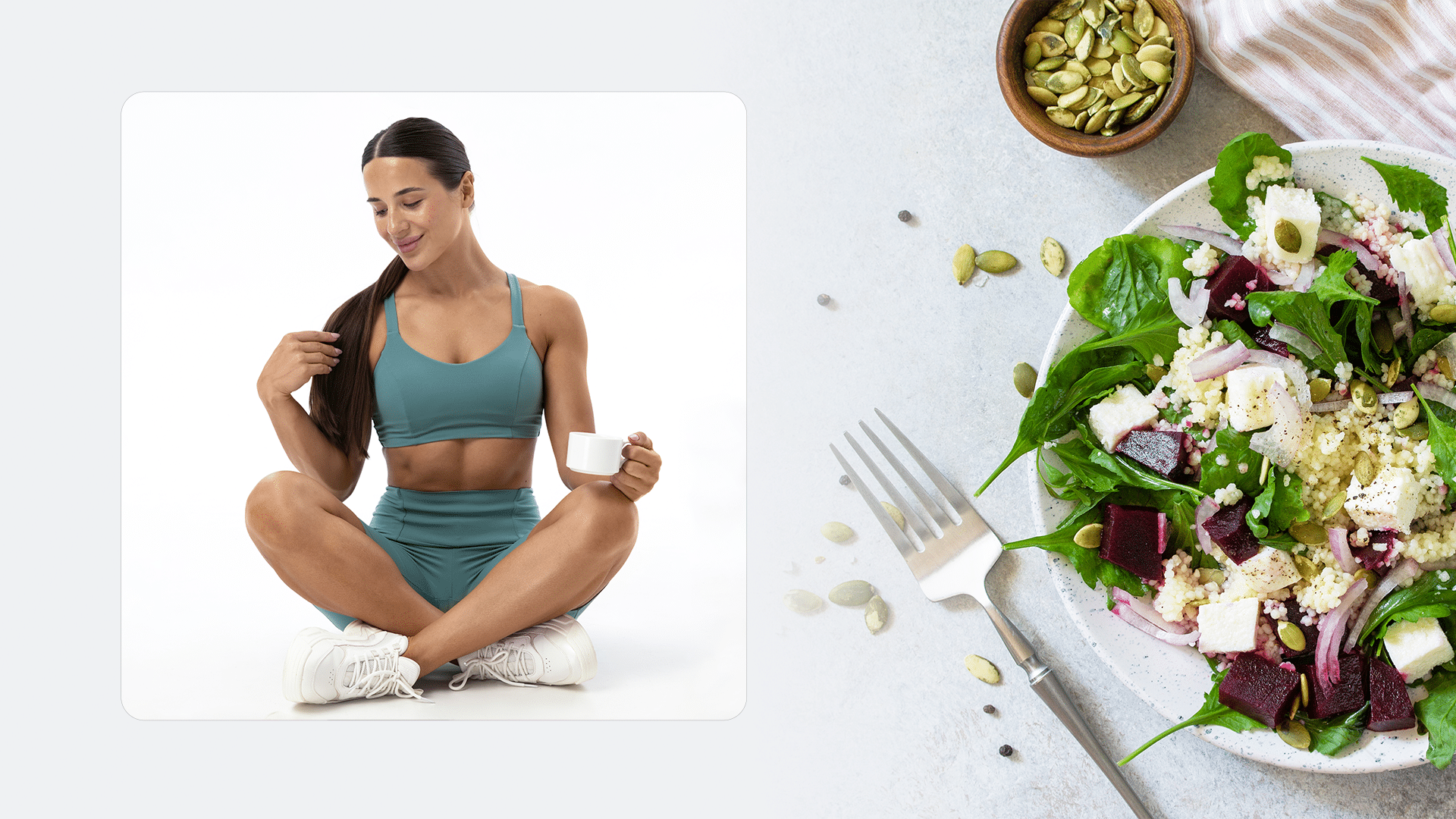Due to such a great amount of training and diets, nowadays people can reach their goal while doing and eating what they like. While some nutritional plans limit the number of consumed calories in general, some aim at the restriction of certain nutrients, and some ban particular types of food. There is a nutrition philosophy which states, “not what to eat, but when.” Today you will look at least famous intermittent fasting 14/10.
This eating pattern is called intermittent fasting and it is widely used to lose and maintain weight and improve health (3). Its main principle is that you are allowed to eat during a certain period of time, which varies depending on what type of fasting you stick to, then followed by the fast when you should only drink water (1). There are different variants of this nutrition pattern, the most popular are 16:8, 12:12, alternate day, and 5:2 fasting (6).
Read on to find out what intermittent fasting 14/10 is, how effective it is, and how you can improve the results of implementing this nutrition philosophy into your routine.
Main Rules Of The Intermittent Fasting 14/10
So, you may, or may have not heard about the 16:8 fasting. It is an eating pattern where you are allowed to eat during an 8-hour period and must only consume water for the rest of 16 hours each day. The intermittent fasting 14/10 is very similar to that type, only here you are allowed to eat whatever you want during a 10-hour window. If you get up early, you can start eating at 7 AM, and then your last meal this day will have to be at 5 PM, followed by a fasting period which will end by 7 AM the next day.
You can also have your first meal at 8 AM or 9 AM, and then your dinner will have to be no later than 6 PM and 7 PM respectively. You can eat your usual meals during the 10-hour window, but you can’t consume any calories during a 14-hour fast. However, you are allowed to drink unsweetened tea or coffee and of course, water.
How Does Intermittent Fasting 14/10 Work?
The intermittent fasting 14/10, especially if accompanied by the well-balanced healthy diet, has shown to be quite effective at weight loss, to say the least. When a person enters a fast, their body has no caloric intake and thus no glucose to burn in order to turn it into energy. But it still needs energy to support the body functions and perform physical and brain activities.
That is when it enters the state called ketosis due to the lack of glucose, and it will start to use the deposited fat. In such a way it can not only only help you lose weight but may also reduce the most dangerous type of fat (visceral fat), which is located around your organs, decreasing the risk of different diseases. Furthermore, if you start to eat healthy during a fast, you are doubling the positive effect of the intermittent fasting 14/10.
Lean and toned up body isn’t just a far-fetched fantasy. Check out the BetterMe app and watch it propel your weight loss journey into high gear!
How Effective Is Intermittent Fasting 14/10 And What Are Its Benefits?
Although most studies on this matter were conducted using 5:2 or 16:8 types of fasting, some provide reputable evidence in favor of intermittent fasting 14/10’s effectiveness at improving cardiometabolic health (7). In general, intermittent fasting has been shown to not only help you reduce your calorie intake, but also improve metabolic markers such as insulin sensitivity (8). As mentioned previously, when your body enters the state of ketosis, it begins to burn fat, preserving your lean muscle tissues. It is recommended that you workout during your eating window, as vigorous physical activity may cause hunger.
Studies also show that such an eating pattern may improve cardiovascular health (9), lower blood pressure, and decrease the risk of serious health conditions such as type 2 diabetes and obesity (4).
This type of intermittent fasting can be a great variant for those who find it difficult to follow the 16:8 fasting. If you sleep 8 hours a day, which is recommended for any adult, you have only 6 hours of fasting left. Besides, a 10-hour eating window is long enough to avoid hunger pangs and still is effective. It may also help you shed pounds.
What To Eat To Promote Weight Loss?
Although intermittent fasting 14/10 doesn’t have any particular food requirements or restrictions, a certain nutritional plan can significantly improve your results. As mentioned before, a healthy and well-balanced diet is key to the doubled effectiveness of fasting. So, if you want to boost your health and slimming process, here are some recommendations on what foods to include to your ration:
-
Fatty Fish, Nuts, Seeds, And Others
As you may already know, not all fat is bad for you and makes you gain weight. Monounsaturated and polyunsaturated fats are so-called healthy fats. They may help you reduce your bad cholesterol level and decrease the risk of heart disease (10). Consumption of fatty fish, such as trout, tuna, sardines, salmon, and mackerel can provide you with healthy fat and protein. Other great sources of unsaturated fats include avocados, olives, flax and chia seeds, nuts (almonds, Brazil nuts, Macadamia nuts, hazelnuts, and others), and nut butter, olive oil, and others (14).
Meat, Eggs, And Legumes
Another vital nutrient is protein. Proteins are building blocks of your body. They are also highly effective as a part of a weight-loss diet. Protein can help you melt fat while preserving the muscles. It is one of the main components of an intermittent fasting 14/10 diet, as it can help you stay fuller for longer. Rich natural sources of protein include meat such as pork, chicken, turkey, bison, low-fat meat; eggs; legumes like beans, lentils, chickpeas, soy and soy products; vegetables such as broccoli, cauliflower, Chinese cabbage, asparagus, Brussels sprouts; dairy products like Greek yogurt, cottage cheese, milk; quinoa, almonds, pumpkin seeds, and others (15, 2).
Read More: 14 Day Boiled Egg Diet: Will It Yield Any Long-Term Results?
-
Dairy And Fermented Food
You can boost your weight loss and overall health if your diet includes plenty of probiotics. They are highly effective when it comes to improving your metabolism and play a prominent role in the healthy balance of bacteria in your gut. They can reduce inflammation and aid in digestion. The most probiotic-rich foods include yogurt, kefir, aged cheese (gouda, mozzarella, cheddar), non-dairy yogurts, sauerkraut, sour dill pickles, kimchi, miso, natto, kombucha, tempeh and others (5).
-
Fruits And Vegetables
You should never give up on fruits and veggies. They are a great source of water and are filled to the brim with essential vitamins, minerals, and fiber. The latter helps you stay satiated for longer, which is vital during a fast as it can prevent hunger pangs. Especially beneficial is the consumption of fruits and vegetables packed with components that boost your metabolism. They include B vitamins which may be found in apples, grapes, watermelon, banana, spinach, potato, and squash; calcium, which occurs in dark green, leafy vegetables and fortified orange juice; iron, present in spinach, potatoes, tomato, chickpeas, and lentils; magnesium from potatoes, bananas and spinach (11);
-
Plenty Of Water
One of the few allowed foods during fast is water. Proper hydration is highly important, it is not only extremely effective in weight loss, but can also visibly boost your health. The unofficially proclaimed standard states that an adult person should drink 8 glasses of water per day, but this norm varies depending on your age, sex, level of physical activity, the climate in which you live, and other factors. The best indicator is your thirst, so the best way is to follow your instincts and drain a glass whenever you feel like doing it (12).
If you tend to let yourself off the hook, raise the white flag when things get tougher than you expected, send yourself on an unconscious binge-eating trip – BetterMe app is here to help you leave all of these sabotaging habits in the past!
What Foods To Avoid During 14/10 Intermittent Fasting?
Sometimes weight loss depends not as much on what you consume, but on what you should avoid. It’s not a secret that certain types of food can make you put on weight and harm your health. To avoid that and to reach your goal more effectively, you should decrease to the minimum your consumption of the following foods and components:
-
Saturated And Trans Fats
These two types of fat belong to the group of “bad” fats. Both saturated and trans fats can harm your body and are recommended to be avoided and substituted by healthy fats. Saturated fats are also called solid fats, due to their ability to become solid at room temperature. Dietitians recommend consuming no more than 13g of saturated fats per day. You can find this type of fat in animal meats and their products, dairy (except for non-fat products), certain vegetable oils (palm oil, coconut oil, and cocoa butter), and processed foods (baked goods, snacks, and others).
Trans fats are not healthier than saturated fats. These fats are manufactured and were widely used in fast-food production, as they are relatively cheap and can be preserved for a longer time. It is best to avoid them completely. Trans fats usually occur in fried foods, some baked goods (doughnuts, pies, biscuits, pastries, and others), cookies, crackers, pizza dough, fast foods, packaged foods, shortenings, and stick margarine (10). Always look for the words “hydrogenated” or “partially hydrogenated” fats or oils on the ingredients list and avoid those product that contain them.
-
Refined Carbs
Every nutrient is essential for the proper functioning of your body, and so are carbohydrates. They provide you with the energy which your body uses to support all the vital internal processes and to perform physical activity. But some carbs should better be avoided. Such carbohydrates are refined carbs. Regular consumption of great amounts of refined carbs may significantly harm your health, causing obesity and increasing the risk of cardiovascular diseases, type 2 diabetes, asthma, osteoarthritis, and others. That is why you should avoid foods that are packed with them, such as white bread, tortillas, bagels, waffles, pastries, breakfast cereals, white rice, pizza, flavored yogurt, cakes, pasta sauce, granola, and others (13).
-
Sugary Drinks
Sugary drinks, such as soda or shop juices are the worst option if you want to trim a couple of inches. They are usually called liquid calories and can significantly increase your daily caloric intake, providing your body with an additional amount of glucose and canceling all your efforts on intermittent fasting 14/10. Instead of sugary drinks, have a cup of unsweetened tea or coffee. They both are extremely low in calories while remaining rich in flavor. As was mentioned before, you can drink these beverages even during your fasting period.
Conclusion
It may be incredibly difficult to choose the diet that would perfectly fit your tastes, bring you impressive results, and not limit you at the same time. If you are tired of trying different diets and giving up on them due to numerous restrictions that just made you break down and binge eat, then perhaps, intermittent fasting 14/10 will be the perfect pick for you. It doesn’t limit your food consumption, nor does it require the types of food you should eat.
Its main rule is that you can eat anything you want for 10 hours a day, and then fast for the next 14 hours. Studies have shown that such an approach is quite effective and can help you not only slim down, but also improve your health, lowering the risk of different diseases. If you top it with a healthy and well-balanced diet, you can expect twice the effectiveness of this nutrition approach. However, nutrition is a serious aspect that plays one of the prominent roles in your life and health. That is why make sure to discuss any changes in the diet with your doctor.
Sticking to a healthy diet based on your health needs, allergies and preferences is a great idea, however when combined with a workout plan that meets your goals, it might bring you significant benefits. Better mood, stronger muscles and endurance are just some.
DISCLAIMER:
This article is intended for general informational purposes only and does not serve to address individual circumstances. It is not a substitute for professional advice or help and should not be relied on for making any kind of decision-making. Any action taken as a direct or indirect result of the information in this article is entirely at your own risk and is your sole responsibility.
BetterMe, its content staff, and its medical advisors accept no responsibility for inaccuracies, errors, misstatements, inconsistencies, or omissions and specifically disclaim any liability, loss or risk, personal, professional or otherwise, which may be incurred as a consequence, directly or indirectly, of the use and/or application of any content.
You should always seek the advice of your physician or other qualified health provider with any questions you may have regarding a medical condition or your specific situation. Never disregard professional medical advice or delay seeking it because of BetterMe content. If you suspect or think you may have a medical emergency, call your doctor.
SOURCES:
- A guide to 16:8 intermittent fasting (2020, medicalnewstoday.com)
- Good Protein Sources (2020, webmd.com)
- ‘Intermittent Fasting’ Diet Could Boost Your Health (2019, webmd.com)
- Intermittent fasting: Surprising update (2020, health.harvard.edu)
- Probiotic foods: What to know (2018, medicalnewstoday.com)
- Seven ways to do intermittent fasting (2020, medicalnewstoday.com)
- Ten-Hour Time-Restricted Eating Reduces Weight, Blood Pressure, and Atherogenic Lipids in Patients With Metabolic Syndrome (2019, pubmed.ncbi.nlm.nih.gov)
- The Benefits of Intermittent Fasting (2020, nytimes.com)
- Time-restricted Feeding for Prevention and Treatment of Cardiometabolic Disorders (2017, pubmed.ncbi.nlm.nih.gov)
- Types of fat: Can fat be good for you? (2020, medicalnewstoday.com)
- Vitamins and minerals that boost metabolism (2018, medicalnewstoday.com)
- Water: Do we really need 8 glasses a day? (2018, medicalnewstoday.com)
- What are refined carbohydrates? (2020, medicalnewstoday.com)
- What are the most healthful high-fat foods? (2018, medicalnewstoday.com)
- What foods are high in protein? (2020, medicalnewstoday.com)











